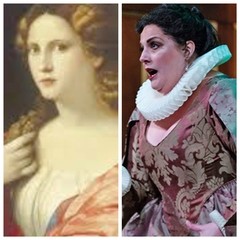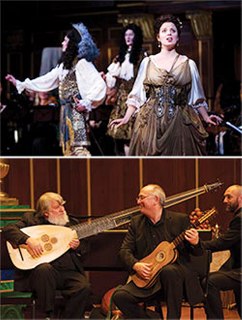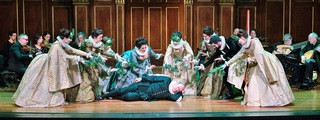|
Back
Medici Style Music and Magic New York
Gilder Lehrmann Hall, Morgan Library
11/26/2018 -
Francesca Caccini: La liberazione di Ruggiero dall’isola d’Alcina
Boston Early Music Festival Vocal Ensemble: Shannon Mercer (Alcina), Colin Balzer (Ruggiero), Kelsey Lauritano (Melissa), Teresa Wakim, Margot Rood, Sonja DuToit Tengblad (Sopranos); Danielle Sampson, Sophie Michaux, Mindy Ella Chu Mezzo-sopranos); Jason McStoots, Thomas Albanase, David Evans (Tenors); David McFerrin (Baritone); Ian Pomerantz, Daniel Fridley (Bass-Baritones)
Boston Early Music Festival Chamber Ensemble: Paul O’Dette, Stephen Stubbs (Chitarrone & Baroque guitar, Musical Directors), Robert Mealy & Julie Andrijeski (Violins), Sarah Darling (Viola), Erin Headley, Christel Thielmann & Laura Jeppsen (Violas da gamba) Kathryn Montoya & Héloïse Degrugillier (Recorders), Maxine Eilander (Baroque Harp), Michael Sponseller (Organ, regal & harpsichord)
Melinda Sullivan (Dance Director), Anna Watkins (Costume Designer), Kathleen Fay (Executive Director)

S. Mercer/F.Caccini (© Kathy Whitman/Public Domain)
“One goes to Tragedy to be moved. One goes to Opera to facilitate the digestion.”
Voltaire, 1732 letter
Nothing personal about the hosts of last night’s opera. But let’s face facts: The House of Morgan is both stingy and cash-strapped, compared to the House of Medici, which produced the original Alcina in 1625.
Yes, the production by the Boston Early Music Festival was a delightful one for singing, orchestra, even the faux-emotional libretto. But one would have assumed that the House of Morgan would have had more in the “spectacle” department.
Where were the floods? The fires? The whales and dragons, the spectral spirits, witches, monsters, devils dancing their dance of death?
The New Yorkers who attended the performance were generous in their applause. But the original audiences in early 17th Century Florence demanded their “special effects” as well as their special artists. Such phenomena were commonplace for the original “plays and ballets with music” for the aristocrats of the time. For besides master composers, singers, instrumentalists and librettists, history’s earliest “operas” had master engineers and stage designers.
The aristocratic audiences who partook of great festivities–hunts and banquets and entertainments–expected the sensations of newly invented machinery, and without it, they would have retired to drink fruity Trebbiano wine.
Yes last night had enough musical effects for a dozen operas–as well as some astounding musical revelations. So one must forgive the Morgan Library and the Boston Early Music Festival for going monster-less and whale-less.
The opera was by Francesca Caccini, whose glories in the early 17th Century were not due to her gender, or being the daughter of an eminent composer of the courts. Instead, within the limits of this new-fangled art of music and words, , she created effects that were intense, dynamic, emotional and frankly quite beautiful.
Yes, Freeing Ruggiero from the Island of Alcina–based on a story from that outrageous Renaissance anthology, Orlando furioso–had a ridiculous plot (by Ferdinano Saracinelli). But no less ridiculous than the exact same opening of Wagner’s Tannhäuser.
Caccini’s Venusberg was the Island of Love, run by a wicked sorcerer named Alcina. When men pleased her, she was a terrific lay (so to speak). When she got bored, she waved her wands, and both the men and their girlfriends became potted plants.
So when the great warrior Ruggiero came under her “hundred knots” he was indeed a happy warrior. He put down is shield and sword, donned some pretty bracelets and necklaces and decided to live the amorous life.
This being the Renaissance, though, men were supposed to “Make War, Not Love.” So a friend of his betrothed sneaked into the Island of Joy, and persuaded him that “Europe is at war” and he must give up love to fight the enemy.
That should have brought on the Special Effects, as they evidently did in Florence, Italy. Sorceress Alcina, feeling offended, turned herself into a witch, summoned up more witches, demons and ghosts from Hell, threatening all sorts of revengeful monsters. Happily, Good destroyed Evil, the Potted Plants were freed to dance, and even Alcina was in the final ballet, where everybody clapped feet and hands, paying homage to the girls of Tuscany, a forthcoming Medici wedding, and praises for the visiting Emperor of Poland.
And where we Manhattanites left the opera for the damp and torrential Midtown New York, the guests 500 years ago would have repaired to the dining hall for a great feast. And more entertainment.
And why the preceding whimsicality for such a delightful opera? Simply Alcina was a total delight. From the entrance of the cast through the audience dressed in Rubens-style costumes to the opening chorus, to recitations which were virtual spechtstimme in feelings to the rhapsodizing on love (Bad!!) and war (Good!!), one felt that Alcina far transcended what we read about early Peri/Caccini operas.
Peri I can’t speak about, but this first viewing of Caccini’s 70-minute-long piece was a revelation. Mainly because the Boston Early Music Festival was such an enraptured affair.

Vocal Ensemble/Instrumental Ensemble (© Boston Early Music Festival)
We start with an instrumental ensemble of unerring rightness, the lutes and chitarrones leading the group (Paul O’Dette and Stephen Stubbs, as usual) never interfering with the simple Italian poetry. We continue with the cast in, yes, the Renaissance costume (along with masks, gloves and green-leaved branches for the human flowers).
The staging was also right. Rather than “choruses”, everybody had a part to play. They could be monsters or shepherds, goddesses or witches. Teresa Wakim was a mere “siren”, but her aria was stunning. David McFerrin was a Neptune, but his strophic beginning was a stirring start.
Each of the small chorus had roles to play, whether serenading Ruggiero (see picture below) or dancing (see later).

C. Balzer (horizontal), Alcina’s assistants (© Kathy Whitman
As for the stars, Alcina was a real personality, (evidently modeled on Homer’s Cyrce, who kept Odysseus imprisoned with love). Shannon Mercer played her as an aging voluptuary turning into a revengeful harridan. Terrific writing, terrific singing. Kelsey Lauritano was the “Leonora” of the opera, sneaking into the love-camp to rescue all the prisoners with disguises and stealth.
Ruggiero was Colin Balzer, who never ever ever camped up a role which could lead to exaggeration. The wondrous thing about the Boston Early Music Festival is that they take these “ancient” treasures and give them the respect which audiences half a millennium ago which would have offered.
The best is last. Not, alas, the splendid music of Ms. Caccini, but the gorgeous dance music of her contemporary, Emilio de’Cavalieri. Whatever the original ending (elephants? Dancing horses?), this was appended with Melinda Sullivan’s so joyous (never ecstatic, simply joyous) steps for the full cast.
In sum, this was a production of joy, real joy. Our appreciation could never be that of its original audiences. But in our own way, and with the scholarly help of the Boston Early Music Festival, we could understand, love and even tap our Baroque feet for the final ballet, when all came together in a rhapsody of Hair-like love for the planet!
Harry Rolnick
|